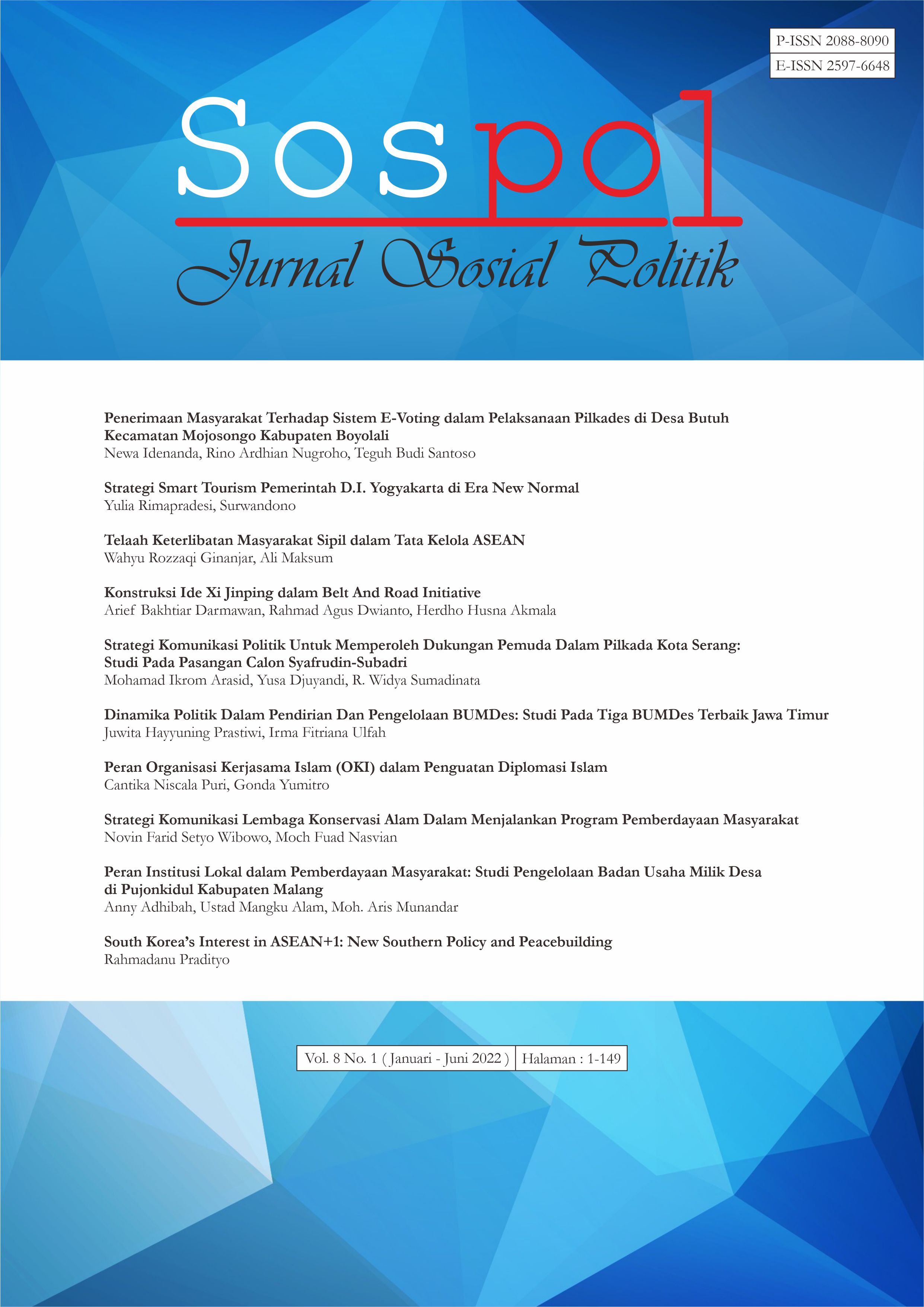Telaah Keterlibatan Masyarakat Sipil dalam Tata Kelola ASEAN
DOI:
https://doi.org/10.22219/jurnalsospol.v8i1.19320Keywords:
Civil Society, Identity, Participation, Policy Making Process, Regional OrganizationAbstract
ASEAN is facing criticism in its journey towards a regional organization that involves civil society participation based on Vision 2020 which was first introduced on 15 December 1997. Whereas after the regional financial crisis in 1997-1998, ASEAN leaders began to promote people-oriented ideas in Southeast Asia. Thus, this paper aims to explain the mechanism for involving civil society in ASEAN governance. The logic of appropriateness about the involvement of civil society in the policy-making process at global institutions becomes a theoretical framework for understanding implementation in regional organizations. This study applies a qualitative analysis method. The technique of collecting data is through literature study that relies on research publications, government reports, and internet-based literature. The results of the study understand that the ASEAN Charter and Guidelines for Affiliation of Civil Society Organizations 2012 are official documents that contain rules for ASEAN in opening up space for civil society involvement in governance in ASEAN. There are three mechanisms for involving civil society in ASEAN governance, namely affiliates, ad hoc consultations and GO-NGO forums. The contribution of civil society is adjusted to the prevailing institutional objectives. However, these three participation mechanisms serve to limit civil society organizations from using these channels to challenge policies or propose alternative agendas.
Downloads
References
Acharya, A. (2013). The Making of Southeast Asia. In The Making of Southeast Asia. https://doi.org/10.7591/9780801466359
Acharya, A. (2014). Constructing a Security Community in Southeast Asia. In Constructing a Security Community in Southeast Asia, Asean and the Problem of Regional Order, Third edition. https://doi.org/10.4324/9781315796673
Alger, C. F. (1999). Strengthening relations between NGOs and the UN system: Towards a research agenda. Global Society, 13(4), 393–409. https://doi.org/10.1080/13600829908443201
Allison, L., & Taylor, M. (2017). ASEAN’s ‘people-oriented’ aspirations: civil society influences on non-traditional security governance. Australian Journal of International Affairs, 71(1), 24–41. https://doi.org/10.1080/10357718.2015.1135870
ASEAN Eminent Persons Group. (2006). Report of the Eminent Persons Group (EPG) on the ASEAN Charter. Retrieved from http://www.asean.org/storage/images/archive/19247.pdf
ASEAN Secretariat. (1997, December 15). ASEAN Vision 2020. Retrieved from https://ditjenppi.kemendag.go.id/assets/files/publikasi/doc_20180515_asean-vision-2020.pdf
ASEAN Secretariat. (2008). Charter of The Association of Southeast Asian Nations. Retrieved from https://asean.org/about-asean/asean-charter/
ASEAN Secretariat. (2012). Guidelines on Accreditation of Civil Society Organisations (CSOs). Retrieved from https://www.asean.org/wp-content/uploads/images/2012/documents/Guidelines on Accreditation of CSOs.pdf
ASEAN Secretariat. (2016). Register of Accredited Civil Society Organisations (CSOs). Retrieved from https://www.asean.org/wp-content/uploads/2012/05/Accredited-Civil-Society-Organisations-as-of-25-May-2016.pdf
Asplund, A. (2014). ASEAN Intergovernmental Commission on Human Rights: civil society organizations’ limited influence on ASEAN. Journal of Asian Public Policy, 7(2), 191–199. https://doi.org/10.1080/17516234.2014.896090
Ba, A. D. (2013). The Association of Southeast Asian Nations: Between Internal and External Legitimacy. In D. Zaum (Ed.), Legitimating International Organizations (Vol. 80, pp. 132–161). https://doi.org/10.1093/acprof:oso/9780199672097.003.0007
Caballero-Anthony, M. (2005). Regional Security in Southeast Asia. In Challenges to Global Security. https://doi.org/10.1355/9789812307095
Chandra, A. C. (2006). Southeast Asian Civil Society and the Asean Charter : The Way Forward. ASEAN Trade Unions-NGOs Dialogue on ASEAN Economic Integration: Defining the Stakes for the ASEAN Working People, (September). Retrieved from https://www.researchgate.net/publication/324437240_Southeast_Asian_Civil_Society_and_the_ASEAN_Charter_The_Way_Forward
Chandra, A. C., Abdulrahim, R., & Almuttaqi, A. I. (2015). Non-state Actors ’ Engagement with ASEAN : Current State of Play and Way Forward. The Habibie Center, 4(Building ASEAN Community: Political–Security and Socio-cultural Reflections), 221–246. Retrieved from https://www.eria.org/ASEAN_at_50_4B.3_Chandra-Almutaqqi-Ibrahim.pdf
Chodor, T. (2020). The G20’s engagement with civil society: participation without contestation? Globalizations, 17(6), 903–916. https://doi.org/10.1080/14747731.2019.1702804
Clark, A. M., Friedman, E. J., & Hochstetler, K. (1998). The Sovereign Limits of Global Civil Society: A Comparison of NGO Participation in UN World Conferences on the Environment, Human Rights, and Women. World Politics, 51(1), 1–35. https://doi.org/10.1017/S0043887100007772
Gerard, K. (2015). Explaining ASEAN’s Engagement of Civil Society in Policy-making: Smoke and Mirrors. Globalizations, 12(3), 365–382. https://doi.org/10.1080/14747731.2015.1016304
Gerard, K. (2021). Interpreting Legitimation Through Participation: The ASEAN Civil Society Conference. JCMS: Journal of Common Market Studies, 59(2), 432–445. https://doi.org/10.1111/jcms.13179
Indrawan, J. (2017). ASEAN Socio-Cultural Community (ASCC) in Conflict Prevention: The Role of Civil Society Organizations (CSOs). JAS (Journal of ASEAN Studies), 4(2), 142. https://doi.org/10.21512/jas.v4i2.1787
Krome, C. (2016). ASEAN and civil society: An incompatible relationship? In T. A. Börzel, L. Goltermann, & K. Striebinger (Eds.), Roads to Regionalism: Genesis, Design, and Effects of Regional Organizations (pp. 215–234). https://doi.org/10.4324/9781315606675
March, J. G., & Olsen, J. P. (2011). The Logic of Appropriateness. https://doi.org/10.1093/oxfordhb/9780199604456.013.0024
McGillivray, M. (2013). Narrowing the Development Gap in ASEAN. In Realizing the ASEAN Economic Community: A Comprehensive Assessment. https://doi.org/10.4324/9780203583715
Mingst, K. (2008). Civil society organizations in the United Nations. In J. Joachim & B. Locher (Eds.), Transnational Activism in the UN and the EU: A Comparative Study (pp. 21–28). https://doi.org/10.4324/9780203887998
Morada, N. M. (2008). ASEAN at 40: Prospects for Community Building in Southeast Asia. Asia-Pacific Review, 15(1), 36–55. https://doi.org/10.1080/13439000802134043
Murray, R. (2004). Constitutive Act of the African Union. In Human Rights in Africa (pp. 280–293). https://doi.org/10.1017/CBO9780511494031.011
Narine, S. (2002). ASEAN in the Aftermath: The Consequences of the East Asian Economic Crisis. Global Governance: A Review of Multilateralism and International Organizations, 8(2), 179–194. https://doi.org/10.1163/19426720-00802006
Olsen, J. (2020). Representing Public Opinion in the EU. In The European Union (pp. 166–180). https://doi.org/10.4324/9780429440724
Quayle, L. (2012). Bridging the gap: an ‘English School’ perspective on ASEAN and regional civil society. The Pacific Review, 25(2), 199–222. https://doi.org/10.1080/09512748.2012.658848
Stone, D., & Wright, C. (2008). The World Bank and Governance. In D. L. Stone & C. Wright (Eds.), The World Bank and Governance: A Decade of Reform and Reaction. https://doi.org/10.4324/9780203969076
Thrandardottir, E., & Keating, V. C. (2018). Bridging the legitimacy gap: a proposal for the international legal recognition of INGOs. International Politics, 55(2), 207–220. https://doi.org/10.1057/s41311-017-0098-9
UN ECOSOC. (1996). Resolution 1996/31: Consultative relationship between the United Nations and non-governmental organizations. Retrieved from http://www.un.org/documents/ecosoc/res/1996/eres1996-31.htm
Weiss, T. G., & Wikinson, R. (2013). Civil Society and NGOs. In T. G. Weiss & R. Wilkinson (Eds.), International Organization and Global Governance (1st ed.). https://doi.org/10.4324/9780203795972
Downloads
Published
How to Cite
Issue
Section
License
Copyright (c) 2022 Wahyu Rozzaqi Ginanjar, Ali Maksum

This work is licensed under a Creative Commons Attribution-ShareAlike 4.0 International License.
Authors who publish with this journal agree to the following terms:
- Authors retain copyright and grant the journal right of first publication with the work simultaneously licensed under a Creative Commons Attribution-ShareAlike 4.0 International License that allows others to share the work with an acknowledgement of the work's authorship and initial publication in this journal.
- Authors are able to enter into separate, additional contractual arrangements for the non-exclusive distribution of the journal's published version of the work (e.g., post it to an institutional repository or publish it in a book), with an acknowledgement of its initial publication in this journal.
- Authors are permitted and encouraged to post their work online (e.g., in institutional repositories or on their website) prior to and during the submission process, as it can lead to productive exchanges, as well as earlier and greater citation of published work (See The Effect of Open Access).

This work is licensed under a Creative Commons Attribution-ShareAlike 4.0 International License.



















